Ethical Wildlife Tourism protects animals and enhances your travel experience in Vietnam. SIXT.VN offers sustainable tour options that respect wildlife while allowing you to explore Vietnam’s natural beauty responsibly. This approach ensures that your adventures support conservation efforts and local communities, fostering a positive impact.
1. What is Ethical Wildlife Tourism and Why Does It Matter in Vietnam?
Ethical wildlife tourism involves engaging in activities that minimize negative impacts on animals and their habitats, promoting conservation and respecting animal welfare. In Vietnam, this is crucial for preserving the country’s diverse ecosystems and protecting endangered species.
1.1. Defining Ethical Wildlife Tourism
Ethical wildlife tourism prioritizes animal welfare and environmental protection. It means choosing tours and activities that:
- Avoid exploiting animals for entertainment.
- Support conservation efforts.
- Educate travelers about local wildlife and ecosystems.
- Benefit local communities through sustainable practices.
According to a report by the World Wildlife Fund (WWF) in 2020, ethical tourism contributes significantly to biodiversity conservation by raising awareness and funding protection efforts.
1.2. The Importance of Ethical Choices in Vietnam
Vietnam’s rich biodiversity faces threats from habitat loss and illegal wildlife trade. Choosing ethical wildlife tourism helps mitigate these issues by:
- Reducing demand for harmful activities like animal performances and exploitative encounters.
- Supporting sanctuaries and conservation projects that rescue and rehabilitate animals.
- Promoting sustainable practices among tour operators and local communities.
By making informed choices, travelers can contribute to preserving Vietnam’s natural heritage for future generations.
1.3. Why is Ethical Wildlife Tourism so Important?
- Better for the Animals: Opting for certified companies that prioritize animal welfare ensures observation without disturbance. This reduces demand for unethical practices, allowing wildlife to thrive in their natural habitats.
- Better for You: Ethical tourism enhances your experience by showcasing animals’ natural behaviors in less stressful environments.
- Better for the Planet: Supporting ethical practices aids in reversing the decline of endangered species and promotes a sustainable wildlife tourism industry.
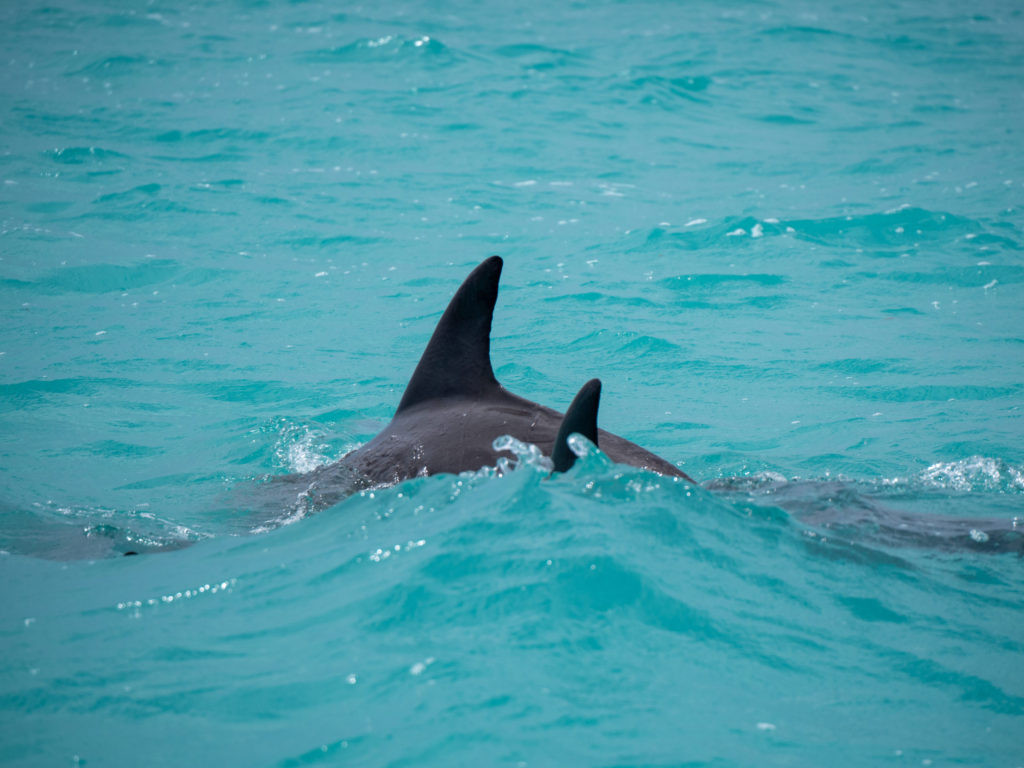 Ethical Wildlife Tourism Dolphin
Ethical Wildlife Tourism Dolphin
2. What are the Key Issues in Wildlife Tourism in Vietnam?
Many wildlife tourism activities in Vietnam do not prioritize animal welfare, leading to exploitation, poor living conditions, and abuse. Understanding these issues is crucial for making ethical travel choices.
2.1. Exploitation of Animals
Exploitation occurs when animals are used primarily for profit without regard for their well-being. Common examples in Vietnam include:
- Elephant riding: Elephants suffer physical and psychological trauma from carrying tourists.
- Animal performances: Animals are often trained using cruel methods to perform tricks for entertainment.
- Tiger petting: Tigers are drugged to make them docile for tourist photos.
According to World Animal Protection, 75% of elephants in the wildlife tourism industry live in severely cruel conditions.
2.2. Poor Living Conditions in Captivity
Many captive animals in Vietnam are kept in inadequate conditions, lacking sufficient space, proper nutrition, and veterinary care. This leads to:
- Stress and abnormal behaviors: Animals exhibit signs of distress due to confinement and lack of enrichment.
- Increased susceptibility to disease: Poor sanitation and inadequate care contribute to health problems.
- Reduced lifespan: Captive animals often die prematurely due to the harsh conditions they endure.
2.3. Animal Cruelty and Abuse
Animal cruelty and abuse are widespread in the wildlife tourism industry. This includes:
- Physical abuse: Animals are beaten, whipped, or otherwise physically harmed during training and performances.
- Psychological abuse: Animals are subjected to stressful and frightening situations that cause long-term trauma.
- Neglect: Animals are deprived of basic necessities like food, water, and medical care.
Unethical tour operators prioritize profit over animal welfare, resulting in severe suffering for the animals involved.
2.4. The Five Freedoms
The Five Freedoms are globally-recognized standards for animal welfare, which many wildlife encounters fail to meet:
- Freedom from hunger and thirst
- Freedom from discomfort
- Freedom from pain, injury, or disease
- Freedom to express normal behavior
- Freedom from fear and distress
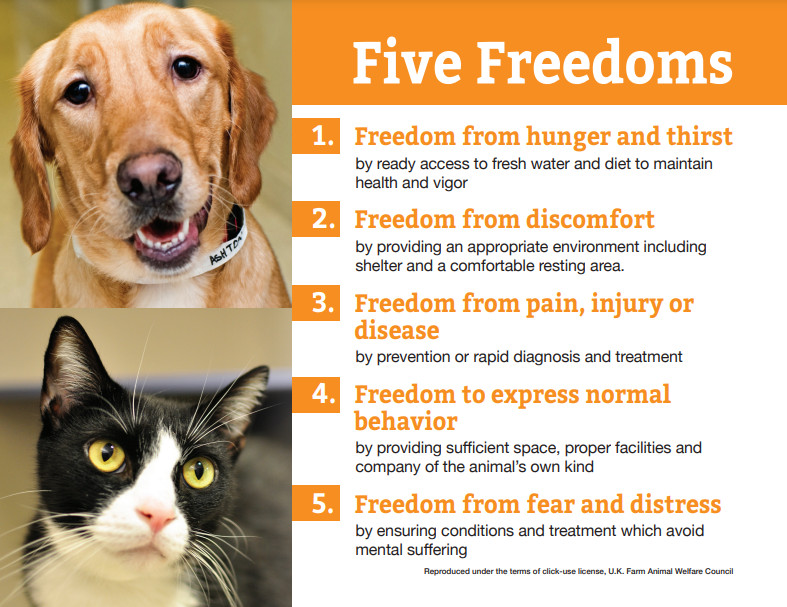 The Five Freedoms
The Five Freedoms
3. How Can You Identify Ethical Wildlife Experiences in Vietnam?
Identifying ethical wildlife experiences requires careful research and awareness of key indicators. By looking for certifications, observing animal behavior, and questioning tour operators, you can make responsible choices.
3.1. Look for Certifications and Endorsements
Certifications and endorsements from reputable organizations indicate a tour operator’s commitment to ethical practices. Some certifications to look for include:
- Advanced Eco-Certification: Signifies a high standard of environmental responsibility and sustainable tourism practices.
- Fair Trade Tourism Certification: Ensures that local communities benefit from tourism activities.
- Blue Flag Certification: Recognizes beaches and marinas that meet strict environmental and quality standards.
3.2. Observe Animal Behavior
Observing animal behavior can provide valuable insights into their well-being. Look for signs of:
- Natural behaviors: Animals should exhibit behaviors typical of their species, such as foraging, socializing, and resting.
- Lack of stress: Animals should appear relaxed and comfortable, not agitated or fearful.
- Healthy appearance: Animals should be well-groomed, with no signs of injury or illness.
3.3. Question Tour Operators
Asking tour operators specific questions can help you assess their commitment to ethical practices. Some questions to ask include:
- How do you ensure the animals’ well-being?
- What conservation efforts do you support?
- How do you minimize disturbance to wildlife?
- Do you allow touching or feeding of animals?
A responsible tour operator should be transparent and willing to provide detailed answers to your questions.
3.4. Activities to Avoid
Certain activities are inherently unethical and should be avoided. These include:
- Elephant riding: Causes physical and psychological harm to elephants.
- Animal performances: Animals are often trained using cruel methods.
- Tiger petting: Tigers are drugged to make them docile for tourist photos.
- Visiting bear bile farms: Bears are kept in cages and their bile is extracted for traditional medicine.
3.5. What Should You Do Instead?
- Research: Investigate tour operators thoroughly and check for certifications.
- Observe: Look for natural behaviors and signs of stress in animals.
- Question: Ask detailed questions about the operator’s ethics and conservation efforts.
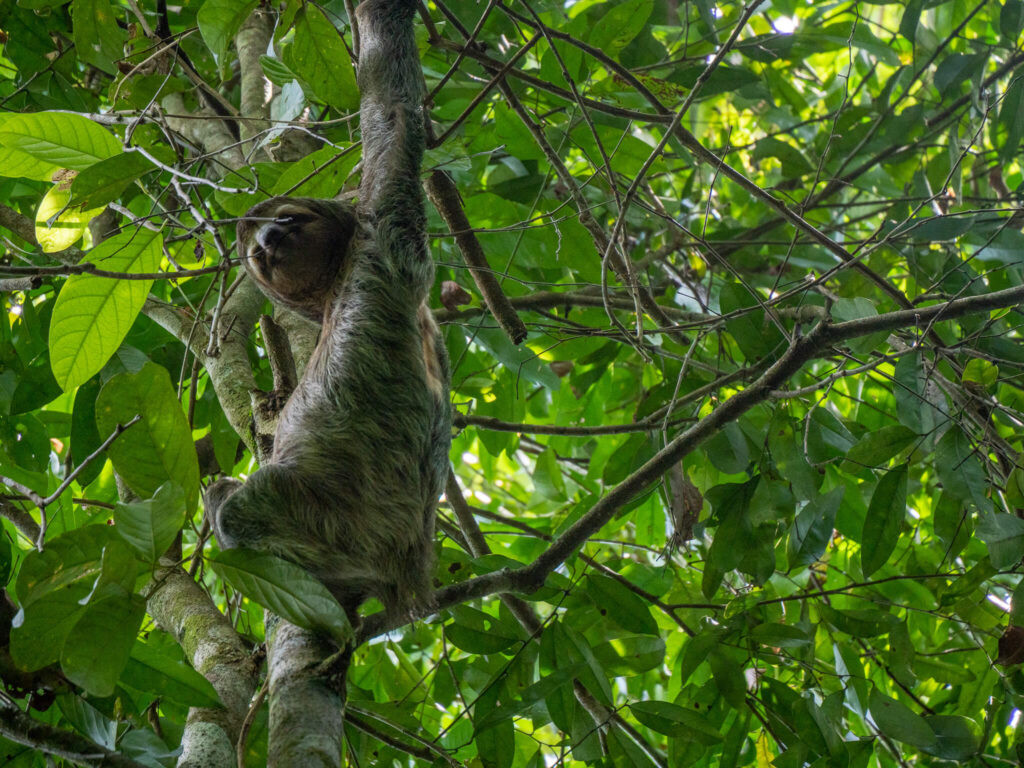 Ethical Wildlife Tourism Sloth
Ethical Wildlife Tourism Sloth
4. Ethical Wildlife Experiences in Vietnam Recommended by SIXT.VN
SIXT.VN offers a variety of ethical wildlife experiences in Vietnam, focusing on conservation and responsible tourism practices. These tours allow you to explore Vietnam’s natural beauty while minimizing your impact on wildlife.
4.1. National Parks and Wildlife Sanctuaries
Visiting national parks and wildlife sanctuaries is an excellent way to support conservation efforts and observe animals in their natural habitats. Some recommended destinations include:
- Cuc Phuong National Park: Vietnam’s oldest national park, home to diverse flora and fauna, including endangered primates.
- Cat Tien National Park: One of the largest national parks in southern Vietnam, known for its diverse ecosystems and wildlife, including gibbons, elephants, and crocodiles.
- Bach Ma National Park: Located in central Vietnam, this park features stunning landscapes, diverse birdlife, and opportunities for hiking and nature observation.
According to the Vietnam National Parks Association, these parks play a crucial role in protecting biodiversity and promoting sustainable tourism.
4.2. Wildlife Rescue Centers
Visiting wildlife rescue centers allows you to support organizations that rescue and rehabilitate animals. These centers provide care for injured, orphaned, or illegally trafficked animals, with the goal of releasing them back into the wild whenever possible. Recommended centers include:
- Save Vietnam’s Wildlife: Focuses on rescuing and rehabilitating pangolins, primates, and other endangered species.
- Endangered Primate Rescue Center (EPRC): Located in Cuc Phuong National Park, the EPRC rescues and rehabilitates endangered primate species.
These centers offer educational tours and opportunities to learn about conservation efforts.
4.3. Sustainable Ecotours
Sustainable ecotours focus on minimizing environmental impact and benefiting local communities. These tours often include activities such as:
- Birdwatching: Observing birds in their natural habitats without disturbing them.
- Nature walks: Exploring trails with knowledgeable guides who provide information about local flora and fauna.
- Community-based tourism: Staying in locally owned accommodations and participating in activities that support local livelihoods.
SIXT.VN partners with tour operators that prioritize sustainable practices and contribute to local conservation efforts.
4.4. Specific Ethical Tours Offered by SIXT.VN
- Cuc Phuong National Park Tour: Explore the park with experienced guides who prioritize wildlife observation and conservation.
- Cat Tien National Park Adventure: Discover the park’s diverse ecosystems and wildlife while supporting sustainable tourism practices.
- Primate Rescue Center Visit: Learn about endangered primates and support rescue and rehabilitation efforts.
SIXT.VN ensures that all tours meet high ethical standards and contribute positively to conservation efforts.
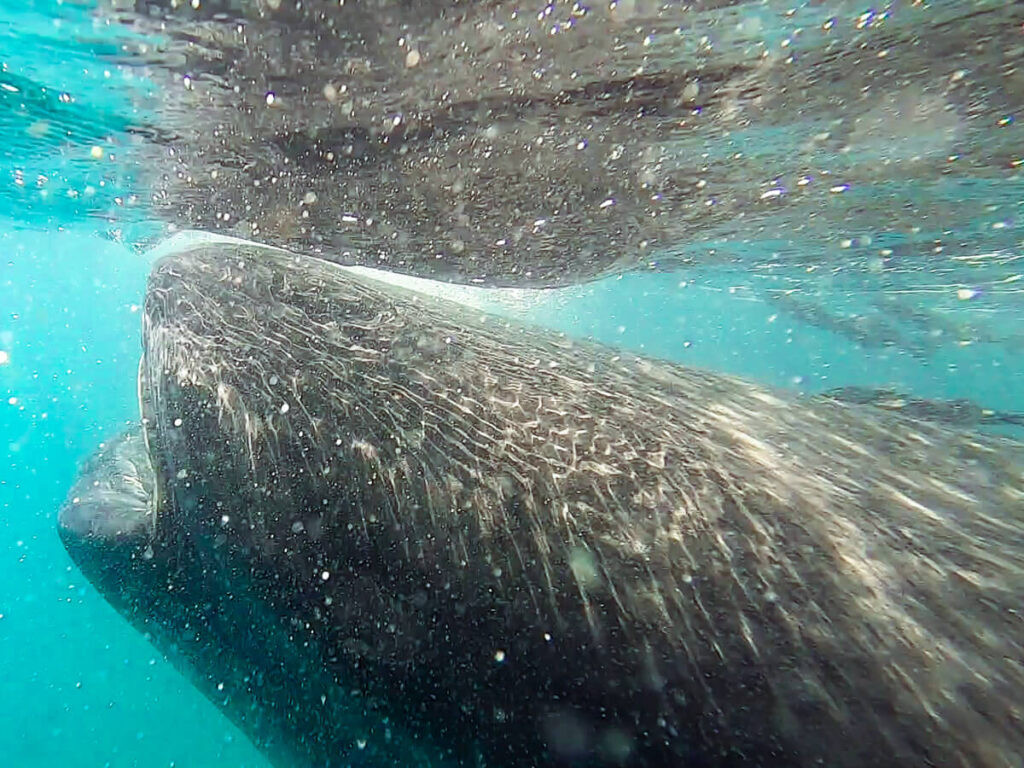 Whale Shark Filter Feeding
Whale Shark Filter Feeding
5. What are the Benefits of Choosing Ethical Wildlife Tourism?
Choosing ethical wildlife tourism offers numerous benefits, including supporting animal welfare, promoting conservation, and enhancing your travel experience. By making responsible choices, you can contribute to a more sustainable and compassionate tourism industry.
5.1. Supporting Animal Welfare
Ethical wildlife tourism directly supports animal welfare by:
- Reducing demand for harmful activities like animal performances and exploitative encounters.
- Promoting humane treatment of animals in captivity.
- Supporting rescue and rehabilitation efforts.
By choosing ethical experiences, you contribute to a world where animals are treated with respect and compassion.
5.2. Promoting Conservation
Ethical wildlife tourism promotes conservation by:
- Raising awareness about endangered species and their habitats.
- Funding conservation projects and research.
- Encouraging sustainable practices among tour operators and local communities.
Your travel choices can help protect Vietnam’s natural heritage for future generations.
5.3. Enhancing Your Travel Experience
Ethical wildlife tourism enhances your travel experience by:
- Providing opportunities to observe animals in their natural behaviors.
- Offering meaningful interactions with local communities.
- Creating a deeper connection with nature and the environment.
You will gain a greater appreciation for Vietnam’s natural beauty and the importance of conservation.
5.4. Supporting Local Communities
Ethical wildlife tourism supports local communities by:
- Providing economic opportunities through sustainable tourism practices.
- Encouraging community-based conservation initiatives.
- Promoting cultural preservation and respect.
Your travel choices can contribute to the well-being of local communities and the preservation of their cultural heritage.
5.5. Contributing to Sustainable Development
Ethical wildlife tourism contributes to sustainable development by:
- Promoting responsible use of natural resources.
- Minimizing environmental impact.
- Supporting long-term economic and social well-being.
By choosing ethical experiences, you can help create a more sustainable and equitable tourism industry.
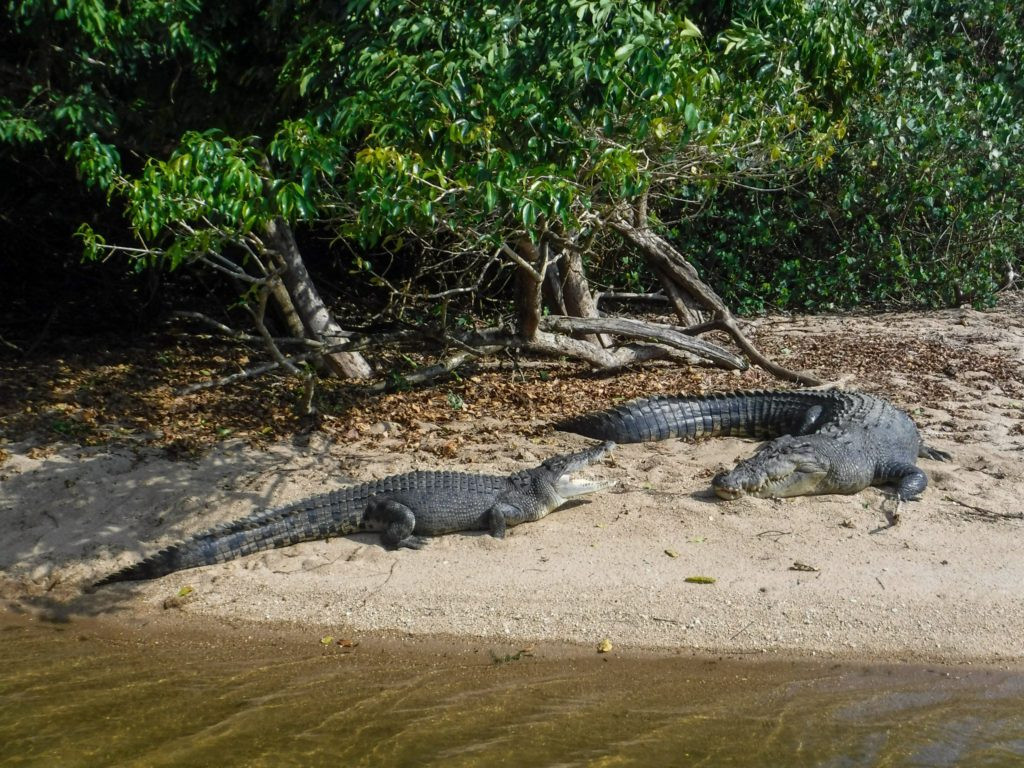 Crocodiles in a natural habitat
Crocodiles in a natural habitat
6. What are the Tell-Tale Signs of Unethical Wildlife Experiences?
Recognizing the signs of unethical wildlife experiences is crucial for making informed choices. Be wary of activities that exploit animals, disrupt their natural behaviors, or prioritize profit over welfare.
6.1. Animals are Incentivized
If animals are fed or baited to attract them for tourist interactions, it is likely an unethical practice. Feeding can disrupt natural feeding patterns, alter behaviors, and create dependency on humans.
6.2. Animals are Exploited
Exploitation occurs when animals are used primarily for profit without regard for their well-being. Examples include elephant riding, animal performances, and tiger petting.
6.3. Animals are Not Respected
Animals need space and the freedom to behave naturally. If tour operators approach animals too closely, harass them, or disrupt their behaviors, it is a sign of disrespect and unethical practices.
6.4. You Can Touch or Hold the Animal
Touching or holding wild animals is generally unnatural and can cause stress or harm. Be wary of activities that allow or encourage physical contact with animals.
6.5. How Did the Animal Get Here?
Consider how the animal came to be in its current situation. If it was taken from its natural habitat, subjected to cruel training, or kept in poor living conditions, it is likely an unethical experience.
6.6. Quick Checklist of Things to Avoid
- Elephant riding
- Animal performances
- Tiger petting
- Feeding wild animals
- Touching or holding animals
- Activities that disrupt natural behaviors
- Tours that prioritize profit over animal welfare
7. How to Plan an Ethical Wildlife Trip to Vietnam with SIXT.VN?
Planning an ethical wildlife trip to Vietnam with SIXT.VN involves researching destinations, choosing responsible tour operators, and making sustainable travel choices. SIXT.VN offers resources and services to help you plan a memorable and ethical adventure.
7.1. Research Destinations and Activities
Start by researching destinations and activities that align with your ethical values. Consider visiting national parks, wildlife sanctuaries, and rescue centers that prioritize conservation and animal welfare.
7.2. Choose Responsible Tour Operators
SIXT.VN partners with tour operators that meet high ethical standards and contribute to conservation efforts. Look for certifications, read reviews, and ask questions to ensure that the tour operator is committed to responsible practices.
7.3. Make Sustainable Travel Choices
Reduce your environmental impact by:
- Choosing eco-friendly accommodations.
- Using public transportation or renting a hybrid car.
- Conserving water and energy.
- Reducing waste and recycling.
- Supporting local businesses and communities.
7.4. Book with SIXT.VN
SIXT.VN offers a variety of ethical wildlife tours and experiences in Vietnam. Our team can help you plan a customized itinerary that aligns with your interests and values.
7.5. Steps to Book a Tour with SIXT.VN
- Visit SIXT.VN: Explore our website to find ethical wildlife tours in Vietnam.
- Select a Tour: Choose a tour that aligns with your interests and ethical values.
- Contact Us: Reach out to our team for assistance with booking and itinerary planning.
- Confirm Your Booking: Review and confirm your booking details.
- Prepare for Your Trip: Pack responsibly and learn about local customs and conservation efforts.
8. What are Some Useful Resources for Ethical Wildlife Tourism?
Numerous resources are available to help you learn more about ethical wildlife tourism and make informed choices. These resources include websites, organizations, and publications that provide valuable information and guidance.
8.1. Websites and Organizations
- World Animal Protection: Provides information about animal welfare issues and campaigns against animal cruelty.
- Fair Trade Tourism: Certifies tourism businesses that meet ethical and sustainable standards.
- Blue Flag: Certifies beaches and marinas that meet strict environmental and quality standards.
- Vietnam National Parks Association: Provides information about national parks and conservation efforts in Vietnam.
8.2. Publications and Articles
- National Geographic: Features articles about wildlife tourism and conservation issues.
- World Wildlife Fund (WWF): Publishes reports and articles about biodiversity conservation and sustainable tourism.
- PLOS One: Publishes scientific research on wildlife tourism and its impacts.
8.3. SIXT.VN Blog
SIXT.VN’s blog features articles about ethical wildlife tourism in Vietnam and tips for planning responsible trips.
9. What are Some Common Misconceptions About Wildlife Tourism?
Addressing common misconceptions about wildlife tourism is essential for promoting ethical practices. Many people are unaware of the negative impacts of certain activities and believe that they are harmless or even beneficial.
9.1. Misconception: All Wildlife Tourism is Good for Conservation
Reality: Not all wildlife tourism contributes to conservation. Unethical activities can harm animals and their habitats, undermining conservation efforts.
9.2. Misconception: Animals in Captivity are Well-Cared For
Reality: Many captive animals are kept in poor conditions and subjected to abuse. Only visit sanctuaries and rescue centers that prioritize animal welfare.
9.3. Misconception: Touching or Feeding Animals is Harmless
Reality: Touching or feeding wild animals can disrupt their natural behaviors and cause stress or harm. It is best to observe animals from a respectful distance.
9.4. Misconception: Supporting Local Communities Justifies Any Activity
Reality: While supporting local communities is important, it should not come at the expense of animal welfare or environmental protection. Choose activities that benefit both communities and wildlife.
9.5. Misconception: If an Activity is Legal, It is Ethical
Reality: Laws do not always reflect ethical standards. Some activities may be legal but still harmful to animals or the environment.
10. What is SIXT.VN’s Commitment to Ethical Tourism?
SIXT.VN is committed to promoting ethical tourism in Vietnam by partnering with responsible tour operators, supporting conservation efforts, and educating travelers about sustainable practices. Our goal is to create meaningful and ethical travel experiences that benefit both people and wildlife.
10.1. Partnering with Responsible Tour Operators
SIXT.VN carefully selects tour operators that meet high ethical standards and demonstrate a commitment to animal welfare and environmental protection.
10.2. Supporting Conservation Efforts
SIXT.VN supports conservation efforts by donating a portion of our profits to local conservation organizations and promoting sustainable tourism practices.
10.3. Educating Travelers
SIXT.VN educates travelers about ethical wildlife tourism through our website, blog, and social media channels. We provide information about responsible travel choices and tips for planning ethical trips.
10.4. Promoting Sustainable Practices
SIXT.VN promotes sustainable practices by encouraging travelers to:
- Choose eco-friendly accommodations.
- Use public transportation or rent a hybrid car.
- Conserve water and energy.
- Reduce waste and recycle.
- Support local businesses and communities.
10.5. Our Vision for the Future
SIXT.VN envisions a future where tourism benefits both people and wildlife, contributing to a more sustainable and compassionate world. We are committed to working towards this vision by promoting ethical practices and supporting conservation efforts in Vietnam.
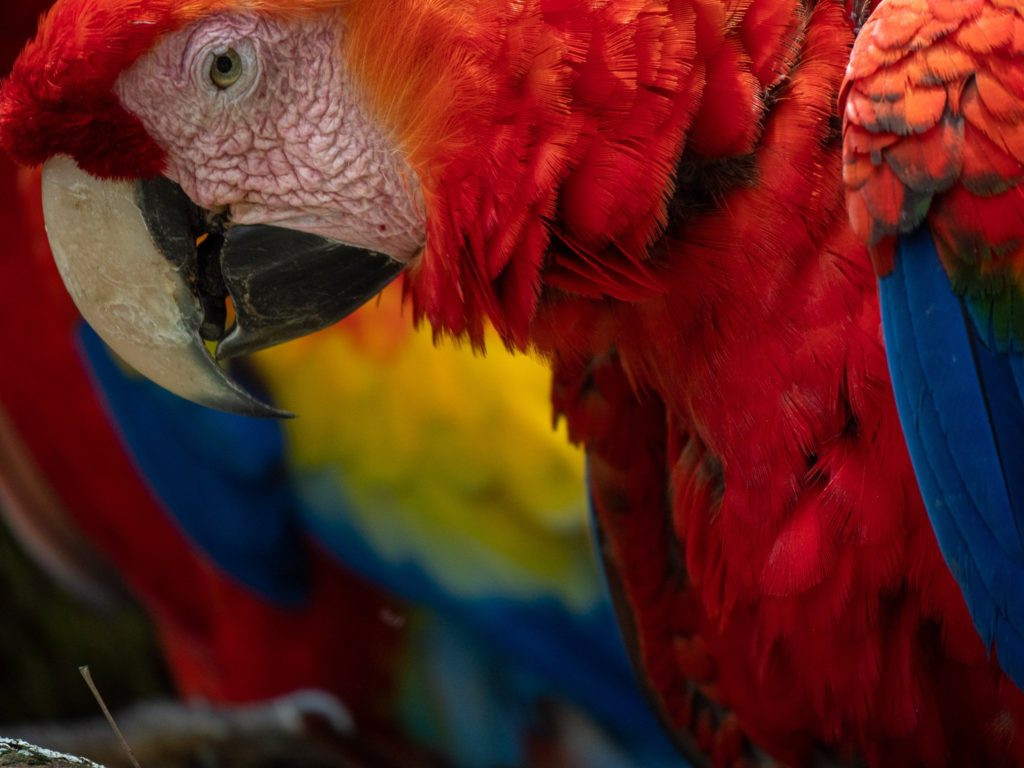 Scarlet Macaw Close Up
Scarlet Macaw Close Up
Ready to plan your ethical wildlife adventure in Vietnam? Contact SIXT.VN today for expert advice and personalized tour recommendations!
Address: 260 Cau Giay, Hanoi, Vietnam
Hotline/Whatsapp: +84 986 244 358
Website: SIXT.VN
FAQ About Ethical Wildlife Tourism
Q1: What exactly is ethical wildlife tourism?
Ethical wildlife tourism involves engaging in activities that minimize negative impacts on animals and their habitats, promoting conservation and respecting animal welfare, ensuring your travels have a positive impact.
Q2: Why is it important to choose ethical wildlife experiences?
Choosing ethical experiences supports animal welfare, promotes conservation, enhances your travel experience, and contributes to sustainable development, helping preserve Vietnam’s natural heritage.
Q3: How can I identify ethical wildlife experiences in Vietnam?
Look for certifications, observe animal behavior, question tour operators, and avoid activities like elephant riding and animal performances to ensure ethical practices.
Q4: What are some unethical activities I should avoid?
Avoid elephant riding, animal performances, tiger petting, and visiting bear bile farms to prevent supporting animal cruelty and exploitation.
Q5: What are some ethical wildlife experiences offered by SIXT.VN?
SIXT.VN offers tours to national parks, wildlife sanctuaries, and sustainable ecotours that prioritize conservation and responsible tourism practices.
Q6: How does SIXT.VN ensure its tours are ethical?
SIXT.VN partners with responsible tour operators, supports conservation efforts, educates travelers, and promotes sustainable practices, ensuring ethical travel experiences.
Q7: What should I ask tour operators to assess their ethical practices?
Ask about their animal welfare measures, conservation support, disturbance minimization, and policies on touching or feeding animals to ensure their ethical commitment.
Q8: What are the benefits of ethical wildlife tourism for local communities?
Ethical tourism provides economic opportunities, encourages community-based conservation, promotes cultural preservation, and supports the well-being of local communities.
Q9: How can I make my trip more sustainable?
Choose eco-friendly accommodations, use public transport, conserve resources, reduce waste, and support local businesses to minimize your environmental impact.
Q10: What if I accidentally book an unethical tour?
If you realize you’ve booked an unethical tour, contact the operator to express your concerns, and consider canceling if possible. Report the activity to relevant authorities and share your experience to raise awareness.



